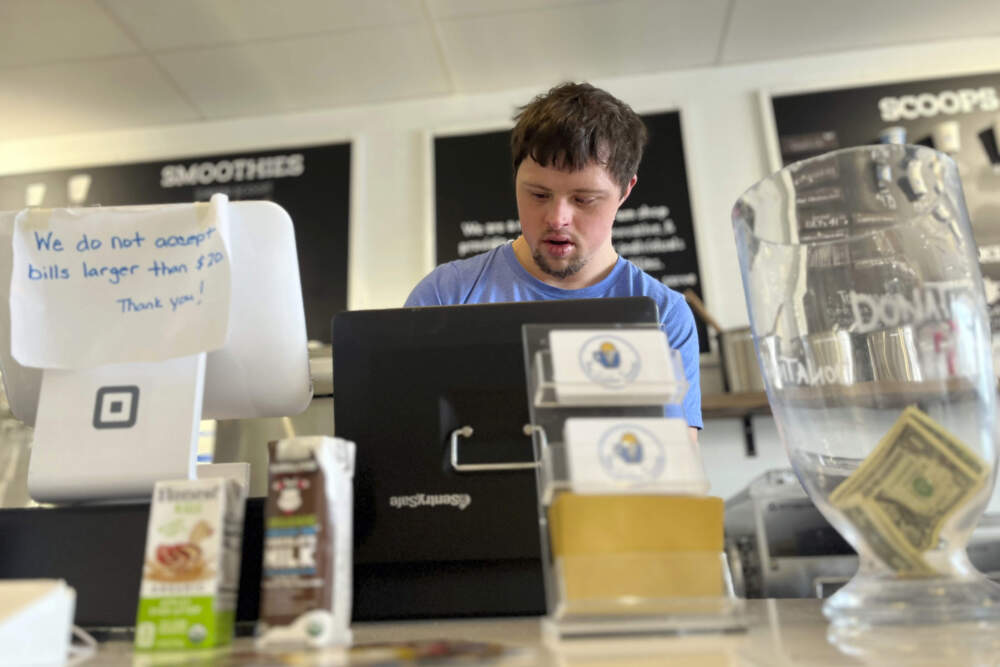Advertisement
People with disabilities are paid less than minimum wage

It is legal for employers to pay people with disabilities, student-learners, and others less than the minimum wage.
Some workers are paid less than $3.50 an hour. The U.S. Department of Labor is looking at changing this practice.
Marissa Ditkowsky, an attorney who focuses on disability economic justice with the National Partnership for Women and Families, speaks about how common subminimum wage is and what reform might look like.
Full interview transcript
Deepa Fernandes: “For decades, it has been legal for employers to pay people with disabilities less than the minimum wage. Even today, it's not uncommon for some workers to earn less than $3.50 an hour.
“The Labor Department has been engaging with advocates on the harms of paying what's called a subminimum wage and what reform could look like. Joining us now is Marissa Ditkowsky, an attorney who focuses on disability economic justice with the National Partnership for Women and Families. Marissa, welcome to Here & Now.”
Marissa Ditkowsky: “Thank you so much for having me.”
Fernandes: “Marissa, can you explain to us how the subminimum wage generally works for disabled workers?”
Ditkowsky: “Yeah. Sure. So the Fair Labor Standards Act, known as FALSA, sets a national requirement for wages and pay.
“There's a section in there that's called 14 C. That section basically creates what employers can apply for so that they can pay certain disabled workers below the federal minimum wage.
“While there used to be a floor that was set for the lowest amount that someone can make, there's no longer any minimum. So, basically, you could make pennies per hour. These wages are based on productivity, so how much a disabled worker could get done per hour compared to a nondisabled worker.”
Fernandes: “Okay. And some people might be wondering why. And as I understand it, this subminimum wage has been around since the 1930s. And when it came in, it was thought to be one of the only ways for some people with intellectual or developmental disabilities to ever hold a job. But, Marissa, our culture has changed since then in terms of growing job opportunities and acceptance. Is this reflected in the workplace or job opportunities for people with disabilities?”
Ditkowsky: “Yeah. Absolutely. There are still a lot of things that are left to be desired in workplaces. There's still a lot of discrimination. There's a lot, in terms of supported employment, that we really do need to improve.
“But it is true that this was passed in 1938 and it's not relevant to our present-day standing of disability or work. It really views disabled work as less valuable even though productivity can vary among nondisabled workers too.
“These really are capitalist beliefs about value that are rooted in sexism, racism, ableism. All of this is work that the National Partnership for Women and Families works on.”
Fernanes: “So can you tell us some of the companies that pay workers with disabilities less than minimum wage?”
Ditowsky: “Goodwill is probably one of the most popular examples. It works differently in each location how Goodwill functions, but there are a lot of Goodwill locations that still do pay their workers just pennies on the dollar. Meanwhile, Goodwill International CEO made about $600,000 in 2022. So that's a pretty big disparity.
“There are also a lot of different other organizations that may be nonprofits, but they place their students or people in their program in for-profit institutions. For example, there was a nonprofit called the Helen Keller National Center in New York, and they placed students in an Applebee's. They also placed students in a Barnes & Noble. These are a lot of different businesses that are really exploiting disabled workers.”
Fernandes: “It's interesting because I am a frequent shopper at Goodwill, and it's very much touted in there that it's a place where people with disabilities can work, and you kind of feel good that you're supporting a place that does that. So it's interesting to learn about the pay disparities.
“I'm wondering how getting paid so little impacts a person's life. I mean, disabled people have expenses too, right?”
Ditkowsky: “Absolutely. I mean, we're thinking about this in conjunction with several other programs for disabled people that leave disabled people In poverty. You have subminimum wage. You have supplemental security income through the Social Security Administration. And the maximum that someone can even make is $914 a month as an individual. And then you also have asset limits through that program, SSI, you have asset limits for a lot of folks who rely on Medicaid to get supported employment services and to get other types of services to live and work in their communities.
“It really does impact the way that disabled people are able to pay for necessities like food, health care, rent, any of those things.”
Fernandes: “And what are states doing to address some of the challenges surrounding the subminimum wage because not every state actually allows it?”
Ditkowsky: “Yeah. That's true. There are about 13 states that have phased out subminimum wage, the first being Vermont in 2002, and the second, Maryland, in 2020. So that's a pretty substantial difference.
“But there are states like Connecticut, New York, New Hampshire, Minnesota that also have bills that are proposed to try to phase out the subminimum wage, though nothing has passed yet.”
Fernandes: “And, ideally, would it be better if the federal government made some reform going forward?”
Ditkowsky: “Yeah. There are a couple of bills in Congress that would phase out the subminimum wage, which would be the most ideal. But, obviously, we aren't really in a position for Congress to necessarily take those actions. So there are federal agencies that have taken steps to try to phase out subminimum wage or to try to figure out what it is that they can do to phase that out.”
Fernandes: “And then I guess, I wonder, and we've heard some businesses argue this, if there wasn't a subminimum wage, would that impact the chances that people with disabilities have of getting hired? So it might almost have an unintended negative consequence for work opportunities for people with disabilities?”
Ditkowsky: “Yeah. So I think that businesses really have an incentive to keep this going. Right? So they will say things like, ‘This isn't possible. This will negatively impact disabled people.’
“And in reality, it is true that raising the subminimum wage alone is not going to fix everything. We really need to make changes to ensure that disabled folks have supported employment services, and all these other things to help them. But that doesn't mean that it's not possible.”
Fernandes: “Marissa Ditkowky is an attorney focusing on disability economic justice with the National Partnership for Women and Families. Marissa, thank you.”
Ditkowsky: “Thank you.”
Ashley Locke produced and edited this interview for broadcast with Julia Corcoran. Grace Griffin adapted it for the web.
This segment aired on December 19, 2023.

